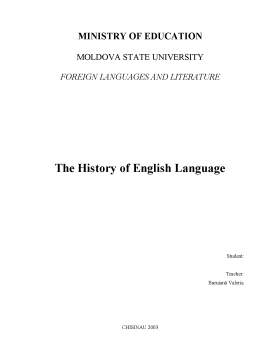Cuprins
- INTRODUCTION 3
- I. OLD ENGLISH (450-1100) 4
- 1. Celtic Tribes 4
- 2. The Romans 4
- 3. Germanic Tribes 10
- 4. The Norman French 15
- II. MIDDLE ENGLISH (1100-1500) 17
- III. MODERN ENGLISH (1500 TO THE PRESENT DAY) 21
- IV. CONCLUSION 24
- V. LIST OF LITERATURE 27
Extras din referat
INTRODUCTION
Why do people all over the world learn foreign languages- Perhaps because the world is getting smaller, in a way: nations are more closely linked with each other than ever before, companies operate world-wide, scientists of different nationalities co-operate, and tourists travel practically everywhere. The ability to communicate with people from other countries is getting more and more important. And learning foreign languages broadens your horizons, too!
Before learners of a foreign language are able to communicate, they have to acquire many skills. They must learn to produce unfamiliar sounds. They must build up a vocabulary. They must learn grammar rules and how to use them. And, last but not least, they must develop listening, speaking, reading and writing skills and learn how to react in a variety of situations.
All people like to travel. Some travel around their own country, others travel abroad. Some like to travel into the future, others prefer to travel into the past. While I was working out my research paper and reading many books on English history, I had an exciting trip into a remote past. It was a fantastical journey our Imaginary Time Machine and a Magic Wand. The Time Machine took me into the depth of the centuries, into the very early history of Britain. I waved the Magic Wand and the words began to talk, they disclosed to me their mysteries, I discovered secrets hidden in familiar things. In other words, you will be a witness of making of English.
I. OLD ENGLISH (450-1100)
1. Celtic Tribes
Make a first turn of the Time Machine and you will find yourself on the British Isles in the time of the ancient inhabitants, the Celts. The Celts were natives of the British Isles long before the English. The Celts had their language, which is still spoken by the people living in the part of Britain known as Wales. And though many changes happened on the British Isles, some Celtic words are still used in the English language.
Two thousand years ago there was an Iron Age Celtic culture throughout the British Isles. It seems that the Celts, who had been arriving from Europe from the eighth century BC onwards, intermingled with the peoples who were already there. We know that religious sites that had been built long before the arrival of the Celts continued to be used in the Celtic period.
For people in Britain today, the chief significance of the prehistoric period (for which no written records exist) is its sense of mystery. This sense finds its focus most easily in the astonishing monumental architecture of this period, the remains of which exist throughout the country. Wiltshire, in south-western England, has two spectacular examples: Silbury Hill, the largest burial mound in Europe, and Stonehenge. Such places have a special importance for anyone interested in the cultural and religious practices of prehistoric Britain. We know very little about these practices, but there are some organizations today (for example, the Order of Bards, Ovates and Druids – a small group of eccentric intellectuals and mystics) who base their beliefs on them.
The Celts preserved their language in some parts of Britain, but they did not add many words to the English vocabulary. Those, that are in use now, are mostly place-names: names of regions, towns, rivers. The Celts had a number of similar words to name rivers, like: Exe, Esk, Usk. All of them come from a word meaning water (uisge). Later this word was used to name a strong alcoholic drink made from barley or rye. It was first called “water of life”. The word changed its from and pronunciation, and today at restaurants in the West one can see on the menu among other spirits whisky, a Celtic word formerly meaning water.
2. The Romans
One more turn of our Time Machine and it took me into the 1st century of our era. At that time Romans came into Britain, they ruled the country for 400 years. So, you can guess that many Latin words came later into the English language through Celts, because, as you know, Romans spoke Latin.
Preview document
Conținut arhivă zip
- The History of English Language.doc











































